- By Dan Veaner
- Around Town
 Print
Print
If you didn't know last weekend was "I Love New York Alpaca Weekend," the hint was that many alpaca farms across the state were open with signs on street corners pointing visitors in the right direction. That included Lansing's Angel Tree Farm on Schofield Road, where the Engels family welcomed guests Saturday and Sunday. "We've had very good attendance," Carol Engels said. "I think people are becoming more aware of alpacas. And it's I Love New york Alpaca weekend. I think it's a big draw for people. They're out visiting farms and it's a great Fall weekend."
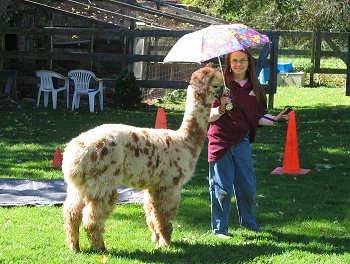
Ashley Engles works with Speckles on umbrella walking,
one of the challenges in the obstacle course event in alpaca shows
The Engels have developed their herd in a remarkably short time. Looking for a way to use their farm that would involve the whole family and fit their lifestyle, they began only two years ago. They invested in breeding stock and produced two crias last year. "We're finally to the point where we've got our herd established," says Carol. "We've got our foundation herd, so now we're selling our excess. We've sold three males, and now we're putting together packages of females and males and crias (babie alpacas)."
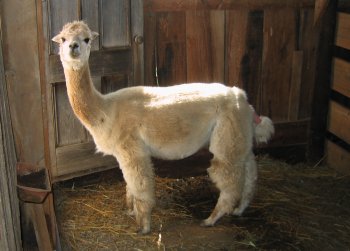
This mom-to-be was four days late on Sunday
But that's not all the family is doing. Daughter Ashley has been showing animals at alpaca shows, and competing with them in the obstacle course event. "I like the reward of the ribbons, and just the fun of the competition and meeting new people," Ashley says. That takes training. "It's best to start right when they're three months old or two months old so they learn to be comfortable going through the obstacle course," she explains. And, like people, some of the animals like performing, while others don't. "Depending on the animal they might be freaked out by so many people. Some animals will love it -- it just depends on the animal."
Of course there is a business side to raising alpacas. Alpaca farmers will tell you that they are the most economical animal to raise, because their byproducts pay for their upkeep. Aside from selling animals that they breed, the fiber can be sold in many forms. "We are selling some raw to spinners," Carol says. "We have also taken some to a mill and are expecting to get our first fiber back in December. So you'll be able to come to the farm and buy some of Kilo's fiber, once you've met Kilo. So you can make a scarf from Kilo."
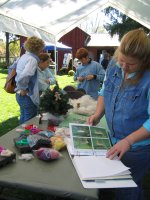
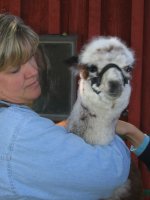
Alpaca crafts (left) and Carol Engels with a friend
A former blacksmith's shop is now an alpaca shop that is open most weekends. "We're trying to get a nice variety in there," says husband Jay. "With our animals we're trying to increase the quality and we're being more selective with our breeding." "We have a lot of felted products, and we're using some local people to do the knitting," Carol adds. "Hats, mittens, and purses seem to be the favorite item. People like the felted purses."
With a growing community of breeders across the country, alpacas are becoming more familiar, but are still exotic enough to attract a crowd. "They're interested in their lifestyle and how they're adapting to the area from their native Chile and Peru," says Carol. "They're interested in the babies. Of course everyone's fascinated by the crias and how old they are, and what size they are. What the gestational period is, and how long they stay with the mother. They're interested in details like that. Especially with the crias. Everyone loves babies."

The alpaca shop is open most weekends
In addition to the shop and the animals themselves, tables were set up where people could try out crafts. Cathie Bagnall brought her spinning wheel and carding machine to demonstrate how the fiber is processed. Bagnall is a breeder and a consultant who supports local farmers who need her experience and knowledge. "For the people who think, 'how could we do this? It's overwhelming.' It's not overwhelming," Carol says. "You just have to go to the people who can be a resource to you. Ask questions and do a lot of reading, and you learn a lot quickly."
Bagnall apprenticed on a farm that imported a large herd of about 300 alpacas before importation was banned in the US. "I learned a lot in a short period of time, because there was a huge volume of animals to work with," she says. "I've been able to share what I learned with my friends that have alpacas." She also acts as a consumer advocate for people interested in buying alpacas for their own farms, or just for pets.
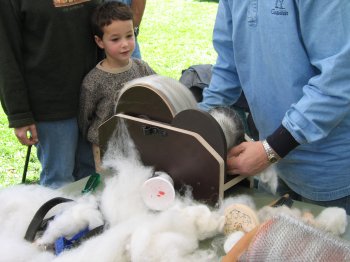
Cathie Bagnall demonstrates carding
The Engels enjoy sharing their experience with visitors. In addition to the alpacas there are two guard llamas, and a collection of peacocks and rabbits. "Once you are around the alpacas and you fall in love with them you find you're thinking about it all the time," Carol says. The farm and the farm store will be open most weekends, Saturdays and Sundays. More formal open houses will be November 11 and in December before Christmas. Jay concludes, "We're having fun."
----
v2i39

Ashley Engles works with Speckles on umbrella walking,
one of the challenges in the obstacle course event in alpaca shows
The Engels have developed their herd in a remarkably short time. Looking for a way to use their farm that would involve the whole family and fit their lifestyle, they began only two years ago. They invested in breeding stock and produced two crias last year. "We're finally to the point where we've got our herd established," says Carol. "We've got our foundation herd, so now we're selling our excess. We've sold three males, and now we're putting together packages of females and males and crias (babie alpacas)."

This mom-to-be was four days late on Sunday
But that's not all the family is doing. Daughter Ashley has been showing animals at alpaca shows, and competing with them in the obstacle course event. "I like the reward of the ribbons, and just the fun of the competition and meeting new people," Ashley says. That takes training. "It's best to start right when they're three months old or two months old so they learn to be comfortable going through the obstacle course," she explains. And, like people, some of the animals like performing, while others don't. "Depending on the animal they might be freaked out by so many people. Some animals will love it -- it just depends on the animal."
Of course there is a business side to raising alpacas. Alpaca farmers will tell you that they are the most economical animal to raise, because their byproducts pay for their upkeep. Aside from selling animals that they breed, the fiber can be sold in many forms. "We are selling some raw to spinners," Carol says. "We have also taken some to a mill and are expecting to get our first fiber back in December. So you'll be able to come to the farm and buy some of Kilo's fiber, once you've met Kilo. So you can make a scarf from Kilo."


Alpaca crafts (left) and Carol Engels with a friend
A former blacksmith's shop is now an alpaca shop that is open most weekends. "We're trying to get a nice variety in there," says husband Jay. "With our animals we're trying to increase the quality and we're being more selective with our breeding." "We have a lot of felted products, and we're using some local people to do the knitting," Carol adds. "Hats, mittens, and purses seem to be the favorite item. People like the felted purses."
With a growing community of breeders across the country, alpacas are becoming more familiar, but are still exotic enough to attract a crowd. "They're interested in their lifestyle and how they're adapting to the area from their native Chile and Peru," says Carol. "They're interested in the babies. Of course everyone's fascinated by the crias and how old they are, and what size they are. What the gestational period is, and how long they stay with the mother. They're interested in details like that. Especially with the crias. Everyone loves babies."

The alpaca shop is open most weekends
In addition to the shop and the animals themselves, tables were set up where people could try out crafts. Cathie Bagnall brought her spinning wheel and carding machine to demonstrate how the fiber is processed. Bagnall is a breeder and a consultant who supports local farmers who need her experience and knowledge. "For the people who think, 'how could we do this? It's overwhelming.' It's not overwhelming," Carol says. "You just have to go to the people who can be a resource to you. Ask questions and do a lot of reading, and you learn a lot quickly."
Bagnall apprenticed on a farm that imported a large herd of about 300 alpacas before importation was banned in the US. "I learned a lot in a short period of time, because there was a huge volume of animals to work with," she says. "I've been able to share what I learned with my friends that have alpacas." She also acts as a consumer advocate for people interested in buying alpacas for their own farms, or just for pets.

Cathie Bagnall demonstrates carding
The Engels enjoy sharing their experience with visitors. In addition to the alpacas there are two guard llamas, and a collection of peacocks and rabbits. "Once you are around the alpacas and you fall in love with them you find you're thinking about it all the time," Carol says. The farm and the farm store will be open most weekends, Saturdays and Sundays. More formal open houses will be November 11 and in December before Christmas. Jay concludes, "We're having fun."
----
v2i39



